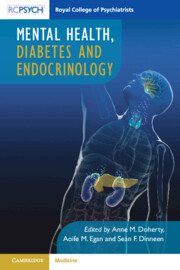Book contents
- Mental Health, Diabetes and Endocrinology
- Mental Health, Diabetes and Endocrinology
- Copyright page
- Contents
- Contributors
- Preface
- Chapter 1 An Introduction to Psychiatry in Endocrinology
- Chapter 2 Depression across Endocrine Disorders
- Chapter 3 Antipsychotic Medications and Metabolic Syndrome
- Chapter 4 ‘Diabulimia’, Diabetes and Eating Disorders
- Chapter 5 Disorders of the Hypothalamic–Pituitary–Adrenal Axis
- Chapter 6 Disorders of the Thyroid and Parathyroid
- Chapter 7 Psychological Factors Impacting on Endocrine Disorders and Self-Management and Medication-Taking Behaviour
- Chapter 8 Cognitive Impairment and Endocrine Conditions
- Chapter 9 Suicidal Ideation and Self-Harm
- Chapter 10 Obesity and Mental Health
- Chapter 11 Gender Incongruence
- Chapter 12 Anti-androgens in Forensic Psychiatric Settings
- Chapter 13 Service- and Setting-Related Challenges
- Index
- References
Chapter 10 - Obesity and Mental Health
Published online by Cambridge University Press: 14 October 2021
- Mental Health, Diabetes and Endocrinology
- Mental Health, Diabetes and Endocrinology
- Copyright page
- Contents
- Contributors
- Preface
- Chapter 1 An Introduction to Psychiatry in Endocrinology
- Chapter 2 Depression across Endocrine Disorders
- Chapter 3 Antipsychotic Medications and Metabolic Syndrome
- Chapter 4 ‘Diabulimia’, Diabetes and Eating Disorders
- Chapter 5 Disorders of the Hypothalamic–Pituitary–Adrenal Axis
- Chapter 6 Disorders of the Thyroid and Parathyroid
- Chapter 7 Psychological Factors Impacting on Endocrine Disorders and Self-Management and Medication-Taking Behaviour
- Chapter 8 Cognitive Impairment and Endocrine Conditions
- Chapter 9 Suicidal Ideation and Self-Harm
- Chapter 10 Obesity and Mental Health
- Chapter 11 Gender Incongruence
- Chapter 12 Anti-androgens in Forensic Psychiatric Settings
- Chapter 13 Service- and Setting-Related Challenges
- Index
- References
Summary
Over 650 million people live with obesity worldwide, and almost all countries are affected by what is considered a global obesity pandemic. It is one of the factors that contribute to excess premature mortality in patients with severe mental illness, who die 15–20 years younger than the general population. Both obesity and mental health disorders are highly prevalent and frequently occur in the same individual. While weight loss is typically associated with improvements in psychological functioning, a certain proportion of patients will develop new psychological issues or experience a relapse of pre-existing conditions. Further work is needed to clarify the underlying biological mechanisms explaining the relationship between obesity and mental health. In the interim, people with obesity should receive care in a multidisciplinary setting with access to mental healthcare integrated with their obesity care.
- Type
- Chapter
- Information
- Mental Health, Diabetes and Endocrinology , pp. 106 - 115Publisher: Cambridge University PressPrint publication year: 2021



